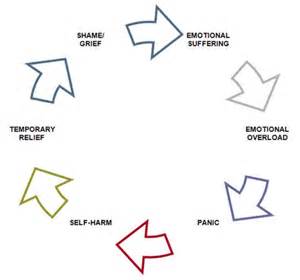". . . an unhealthy way to cope with emotional pain, intense anger, and frustration."
This is what self-harm is, a coping skill. Is it a good coping skill? No, but it is a coping skill. Most people self-harm, not to commit suicide, but to stop themselves from committing suicide. It sounds crazy, I know, I've lived with it in my home and it wasn't pretty. One of the issues with self-harm, or cutting in my son's case, is that in this act of not trying to commit suicide the self-harmer can become so overwhelmed with intense feelings they may not realize how severe they are self injuring and accidently kill themselves.
The self-harm releases endorphins into the system, creating a type of "high." This release of endorphins makes the self-harmer feel better for that moment and helps to reduce their intense emotional overload. The problem is, apart from the obvious, the "high" can be addictive. The self-harm then becomes a vicious addictive circle of emotional suffering, emotional overload, panic, self-harm, and temporary relief.
As a parent you want to protect your child from all the bad things that might come into their life, but how do you protect them from themselves?
Teaching the self-harmer helpful coping skills is the only way to help them. They must have a way to release their intense feelings of pain, but in a healthy, productive way. There are many websites out there dedicated to self-harming and they all have good information. After much research, the following are some of the best sites I have found:
www.selfinjuryfoundation.org
www.selfinjury.com
www.selfinjuryhelp.com
www.helpguide.org
There are also many facilities that treat self-injurious behavior, but they usually aren't covered under insurance and they are very expensive. Do they work? Yes, while the person is there, but, like with any addiction, unless the self-harmer truly wants to stop and use healthy coping skills nobody can force them to stop. Love and validation of their feelings are the best way to help a self-harmer. They need to know they aren't being judged and that they are still loved, even though they are doing this "thing" that seems abhorrent.
My son suffers from the addiction of self-harming. He has learned many healthy coping skills and he has spent many months in psychiatric facilities, but even now, after several years, he still falls into self-harming behavior when his depression and emotional pain overwhelm him. He knows it isn't the healthy thing to do and he tries many other coping skills, but he often goes back to this obsession because it is easy and, at that moment, it works. He struggles everyday with it and one day, I am hopeful, he will beat it.
After seventeen months in a residential treatment center my son, who was sixteen years old at the time, wrote this about self-harm.
"A single reason to continue on this path I have made for such a long time has left me completely. Now I find myself searching for what used to be, instead of what should be. Lost and confused, I stagger back and forth for a while, trying to find my balance.
The initial shock has kicked in and a life with this, this lack of what I depended on, is flashing before my eyes. At first glance I yearn for my satisfaction once again. I want to cradle my obsession, and love my obsession, but leaving impulse behind requires me to think forwardly and consequentially. The potential my life now holds is not fathomable. I am slowly beginning to realize what this has held me from becoming. That I am capable of achieving all my aspirations. That the monster that has festered for, it seems like an eternity, inside of me can be tamed. And being held back from the true self will only cause me to bask in the reality that is me. Relishing the every moment I succeed."
Don't judge the self-harmer in your life, instead help them tame the monster that festers inside of them.

 RSS Feed
RSS Feed